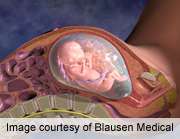Sleep-disordered breathing may affect pregnancy outcomes

(HealthDay)—Sleep-disordered breathing (SDB) may be associated with adverse pregnancy outcomes, according to research published in the June issue of the American Journal of Obstetrics & Gynecology.
Francesca L. Facco, M.D., of the University of Pittsburgh, and colleagues conducted a planned analysis of a prospective cohort of 188 women to assess the prevalence and trends of SDB and its effect on pregnancy outcomes.
The researchers found a dose-dependent relationship between the severity of SDB in early pregnancy and the risk of developing gestational diabetes (no SDB, 25 percent; mild SDB, 43 percent; moderate/severe SDB, 63 percent). Among women with moderate/severe SDB in early pregnancy, the adjusted odds ratio for developing gestational diabetes was 3.6 (95 percent confidence interval, 0.6 to 21.8). No association was detected between SDB exposure in early or late pregnancy and any of the other adverse pregnancy outcomes, including preeclampsia, preterm birth less than 34 weeks, and small-for-gestational-age (less than 5 percent) or large-for-gestational-age (greater than 95 percent) neonates.
"This study suggests a dose-dependent relationship between SDB exposure in early pregnancy and the subsequent development of gestational diabetes," the authors write.
More information:
Abstract
Full Text
Copyright © 2014 HealthDay. All rights reserved.

















